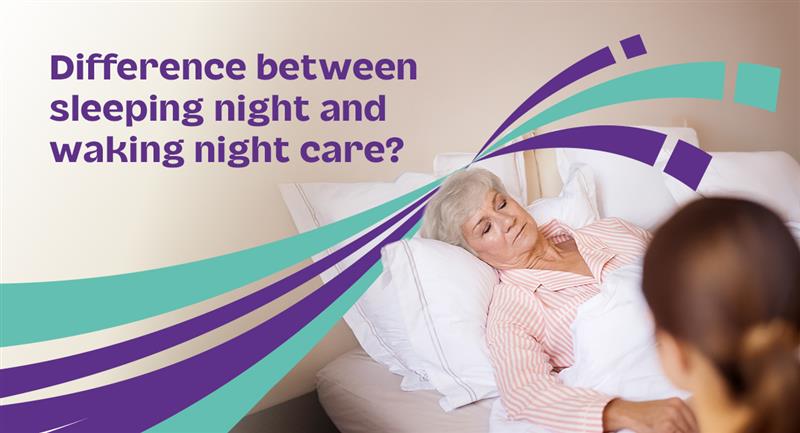
Cost of Sleeping Night and Waking Night Care for Caregivers in the UK?
Overnight care refers to a form of care service where a carer stays with you throughout the night providing you with the assistance and support that is needed. The overnight care can be of mainly two types based on the type of help and support required, i.e., sleeping night care and waking night care.
In this blog, we will look at:
a) Different types of night care
b) Differences between Sleeping Night Care and Waking Night Care
c) Pricing for different services
This information will help families and caregivers make informed choices about homecare.
What is Sleeping Night Care?
Sleeping night care, sometimes called sleep-in care, is a type of overnight care service, where the comfort of a carer is available throughout the night. During sleeping night care, while the carer rests or sleeps, they are there for you to support whenever you need it.
In this type of care service, mostly your carer is likely to be living with you in your home as a live-in carer, so that you won’t have to arrange a time for your carer to arrive. Sleeping night care services are ideal for those who might require occasional help during the night, such as assistance with toileting or repositioning.
Key points about Sleeping Night Care:
- The carer is provided with comfortable sleeping arrangements.
- The carer may wake up once or twice during the night without extra costs.
- Typically suited for clients who are relatively independent but need reassurance or minor help.
- Cost-effective compared to waking night care.
What is Waking Night Care?
Waking night care involves having a night support worker or night care assistant who stays awake and monitors the individual care throughout at night. This service is designed for individuals who require constant supervision, such as those with complex medical needs or dementia.
With a waking night care, you can rest easy as a professional carer is available throughout the night. Being always on call, awake, and alert, they attend to your needs, providing constant help and support. Mostly, in a scenario where the waking night care is used, there will be one day-time care and one night-time carer, thereby ensuring that there is someone ready to be at service around the clock, who is well slept and refreshed
Key points about Waking Night Care:
- The carer is actively awake and alert all night.
- Provides constant monitoring for safety and well-being.
- Suitable for individuals who may experience frequent wakefulness, restlessness, or medical emergencies.
- It requires more involvement and costs more than sleeping night care.
- Waking night care takes place in the comfort of their homes, allowing people to maintain a sense of familiarity and continuity in their lives.
How does sleeping night care differ from waking night care?
Although both sleeping night care and waking night care may sound synonymous, there are some differences that distinguish both the services from each other.
The sleeping night care service involves carers who are present overnight but sleep, providing support when needed. Waking night care involves a professional caregiver who stays awake and alert all night to ensure that you are provided with care and support.
Sleeping night care is often opted by people who need occasional support during the nighttime and do not require continuous assistance. The frequency of support for sleeping night care provides help up to two times per night. On the other hand, waking night care is suitable for people who require frequent or continuous assistance and monitoring during the night. This type of care is better for people with complex or ongoing needs. This includes monitoring medical conditions and dealing with frequent waking or restlessness.
Responsibilities and Benefits
Responsibilities of Sleeping Night Carers:
1) Providing reassurance if the individual wakes up.
2) Assisting with minor tasks such as using the bathroom or repositioning.
Responsibilities of Waking Night Carers:
1) Monitoring for medical emergencies.
2) Offering consistent care and support, including tasks like administering medication.
3) Offering emotional support and companionship.
Benefits and Importance of Overnight Care Services
Benefits of Sleeping Night Care:
a) Affordable for families.
b) Provides peace of mind knowing someone is nearby.
c) Ideal for individuals needing minimal nighttime support.
Benefits of Waking Night Care:
a) Ensures safety for individuals with complex needs.
b) Provides continuous care and attention.
c) Timely medication administration
d) Reduces risks of accidents or emergencies during the night.
Sleeping v/s Waking Care Service: Cost Comparison for carers
The rates of sleeping night care and waking night-care for carers in the UK varies depending on the provider, location, and level of care required. Sleeping night care, where the caregiver is present overnight but sleeps and provides assistance only when needed (typically up to 2-3 times per night), generally costs between £15 to £20 per hour and costs between £150 and £200 per night.
On the other hand, waking night care, which involves a support worker/caregiver staying awake throughout the night to offer continuous support, is priced at an hourly rate ranging from £25 to £30 per hour. This typically results in a total cost of £200 to £250 per night, depending on the duration and specific care needs. These figures are approximate and may vary, so it’s recommended to contact local care providers for a tailored quote.
Nurses Group Homecare: Your Partner for Homecare Services
When it comes to care services in the UK, Nurses Group Homecare has been in the forefront, providing high-quality care services. We at Nurses Group Homecare ensure that our clients are matched with highly skilled and compassionate carers who we work with based on crucial aspects such as experience, training, and personality.
With Nurses Group Homecare, arranging homecare services is effortless. All you need to do is to give our friendly team a call and we can recommend to you the most suitable service you are required of based on your personal circumstances.